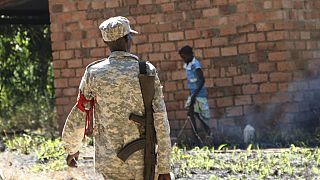Democratic Republic Of Congo
The Democratic Republic of Congo is reeling from the effects of the fall in copper prices.
Lubumbashi in particular has been hit hardest as several mines have downsized their workforce to adapt to the new prices.
“We have really been affected by the fall of metal prices. We have also reduced the staff which was at 250, now we are only 200,” said Dieudonne Kisimba Selemani, an administrator of the Congo Steel Mills company.
Since the slump of metal prices in 2015, the economy of the world’s fifth largest copper producer has been greatly affected including the lives of the mine workers.
“Before, I used to provide for my family with my wages. Today, I have to dig deep in my pockets to be able to feed my house. I will soon be bankrupt,” said one of the mine workers.
In April 2016, global copper prices were set at 4,873 dollars per tonne, a decline of about 20% compared to previous years.
#Commodities Watch: #Copper prices drop to 3-month low, dragging
— Javier Blas (JavierBlas2) May 18, 2016AngloAmericanand #Glencore shares 5% down pic.twitter.com/2wl4AGl8un
Copper production in DRC which is Africa’s largest copper producer lowered to 995,805 tonnes last year, but, there is still pressure on the government to generate more revenue from the sector.





![Africa's hight cost of climate change [Business Africa]](https://static.euronews.com/articles/stories/08/77/73/84/320x180_cmsv2_065e40c7-90d8-5143-b8da-c4885db015dc-8777384.jpg)







Go to video
What to know about a standoff between police and illegal miners at a South Africa mine
Go to video
SADC extends mandate of its troops in DRC and Mozambique
00:45
Ramaphosa calls for peaceful resolution to illegal miner standoff
Go to video
South Africa: Ramaphosa urges safe resolution in Stilfontein Mining standoff
Go to video
Mali: Director of Australian gold company arrested
11:07
Botswana's new government races to diversify its economy {Business Africa}